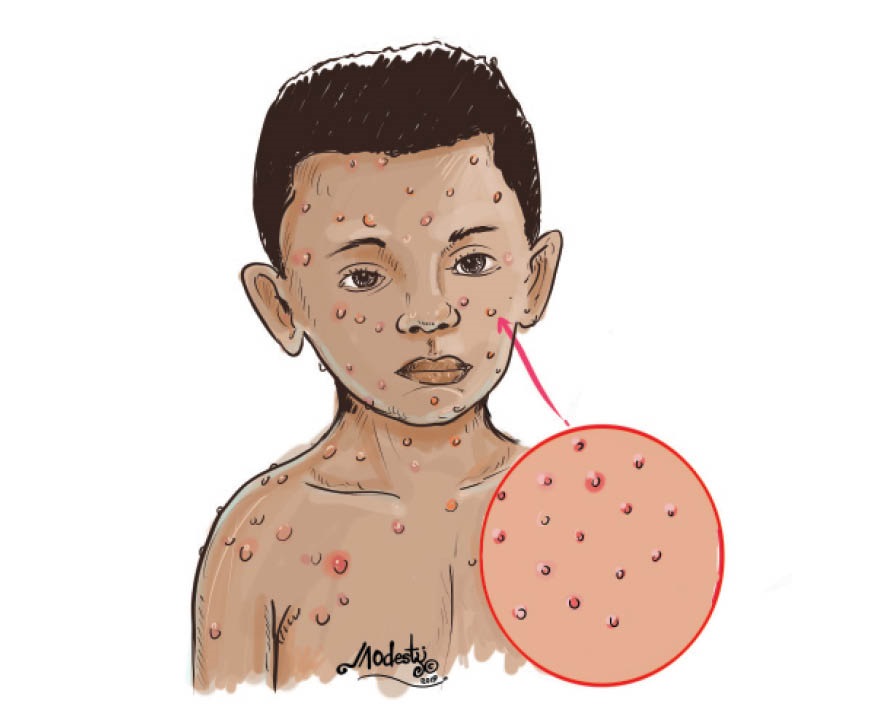How to protect yourself from chicken pox
Madam Dauda first noticed that her five-year-old son had fever and suffered loss of appetite. Two days later his whole body was covered with bumps and blisters which he scratched persistently. “I rushed him to the hospital and he was diagnosed with chicken pox. After a week he started getting better but his one year […]

How to protect yourself from chicken pox
Madam Dauda first noticed that her five-year-old son had fever and suffered loss of appetite. Two days later his whole body was covered with bumps and blisters which he scratched persistently.
“I rushed him to the hospital and he was diagnosed with chicken pox. After a week he started getting better but his one year old younger brother also soon came down with the symptoms and had a more severe case than his older brother,” she recalled.
She said though both boys are now better, she’s afraid she might soon come down with the disease too. “I learnt people who have suffered from the disease before develop immunity against it and will never suffer from it again. I will still go to the hospital for medicines or vaccines to prevent getting infected,” Madam Dauda said
Cecilia, 16, lives in one of the suburbs of the Federal Capital Territory (FCT). She said a number of persons in her neighbourhood suffered from chicken pox between November last year and January this year.
She said a seven-year-old boy in the neighborhood first came down with the disease.
“The boy said he contacted it from one of his classmates who he often plays with at school. Then a next door neighbour who is about 35 years old became ill with the disease and then me and some other persons.
“Nobody died from the disease but some cases were worse than others. In my case, I suffered chest pain too and couldn’t swallow food,” she said.
According to a General Medical Practitioner, Dr Muhammad Hamza, chickenpox (varicella) is a viral infection that causes an itchy rash with small, fluid-filled blisters.
He said chickenpox infection appears 10 to 21 days after exposure to the virus and usually lasts about 5 to 14 days. He added that even though it often affects children, adults that haven’t been vaccinated could be affected especially when they have contact with an infected person.
Dr Hamza explained that an itchy rash is the most common symptom of chickenpox.
He said: “The infection will have to be in your body for around 7 to 21 days before the rash and other symptoms develop. The virus is contagious to those around an infected person for one to two days before blisters appear, meaning you start to be contagious to those around you up to 48 hours before the skin rash starts to occur. Non-rash symptoms may last a few days and include fever, headache, and loss of appetite.”
The physician said the virus can spread through saliva, sneezing, contact with fluid from the blisters and coughing.
He added that the best way to prevent chicken pox is to be vaccinated.
“Chickenpox vaccine prevents the disease in 98 percent of people who receive the two recommended doses. Your children should get the shot when they are between 12 and 15 months of age. Children get a booster between 4 and 6 years of age. Older children and adults who haven’t been vaccinated or exposed may receive catch-up doses of the vaccine.
“As chickenpox tends to be more severe in older adults, people who haven’t been vaccinated may opt to get the shots later,” Dr Hamza advised.
He said people diagnosed with chickenpox should manage their symptoms while they wait for the virus to pass through their system.
He advised parents to keep their children away from school and day care when they have the disease to prevent it from spreading.
“Infected adults also need to stay home,” he said. “Always visit your doctor once symptoms are noticed to prescribe medications or topical ointments to help relieve itching. You can also soothe itching skin at home by taking lukewarm baths, applying unscented lotion, and wearing lightweight, soft clothing.”
The doctor said anti-viral drugs may be prescribed if one experiences complications from the virus or was at risk of adverse effects.
“People at high risk are usually the young, older adults, or those who have underlying medical issues. These anti-viral drugs do not cure chickenpox. They make the symptoms less severe by slowing down viral activity. This will allow your body’s immune system to heal faster,” he added.
